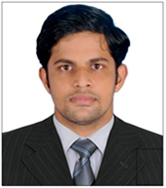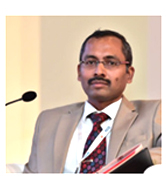M.Tech. Power Systems Engineering
M.Tech. Power Systems Engineering
Eligibility
Fee Structure
Program Details
Eligibility
Eligibility for Admission
B.E / B.Tech. EEE / ECE / E&I / ICE / Electronics / Instrumentation or Equivalent degree in relevant field with a minimum CGPA of 5.0 / 50% of marks.
- Admission is based on the CGPA /Percentage obtained in the UG degree and performance in the Crescent University Admission Test (CUAT-2025) conducted by our institute.
- Applicants who have already appeared in the National level Entrance Exams like GATE, TANCET, etc., and have secured valid scores are exempted from appearing CUAT.
Fee Structure
Admission 2025-26
Tuition fee can be paid in two instalments in a year (semesterwise)
| Name of the Programme | Tuition Fee Per Year (INR) | Amenities and Service Fee (INR)(One–time) |
|---|---|---|
| M.Tech. Power Systems Engineering | 80,000 | 20,000 |
Program Details
Admission Brochure
Programme Educational Objectives:
- To develop competent and skilled power system engineers to meet the national and international industrial requirements
- To meet the day to day challenges faced by the power sector due to deregulation and to equip the students in power system software applications
- To meet the challenges of today’s clean energy sector and to contribute to the environmental social concerns
- To train the students to realistic industrial environment, meeting the modern engineering practices
Programme outcomes
- Engineering knowledge: Apply the knowledge of mathematics, science, engineering fundamentals, and an engineering specialization to the solution of complex engineering problems
- Problem analysis: Identify, formulate, review research literature, and analyze complex engineering problems reaching substantiated conclusions using first principles of mathematics, natural sciences, and engineering sciences
- Design/development of solutions: Design solutions for complex engineering problems and design system components or processes that meet the specified needs with appropriate consideration for the public health and safety, and the cultural, societal, and environmental considerations
- Conduct investigations of complex problems: Use research-based knowledge and research methods including design of experiments, analysis and interpretation of data, and synthesis of the information to provide valid conclusions
- Modern tool usage: Create, select, and apply appropriate techniques, resources, and modern engineering and IT tools including prediction and modeling to complex engineering activities with an understanding of the limitations
- The engineer and society: Apply reasoning informed by the contextual knowledge to assess societal, health, safety, legal and cultural issues and the consequent responsibilities relevant to the professional engineering practice
- Environment and sustainability: Understand the impact of the professional engineering solutions in societal and environmental contexts, and demonstrate the knowledge of, and need for sustainable development
- Ethics: Apply ethical principles and commit to professional ethics and responsibilities and norms of the engineering practice
- Individual and team work: Function effectively as an individual, and as a member or leader in diverse teams, and in multidisciplinary settings
- Communication: Communicate effectively on complex engineering activities with the engineering community and with society at large, such as, being able to comprehend and write effective reports and design documentation, make effective presentations, and give and receive clear instructions
- Project management and finance: Demonstrate knowledge and understanding of the engineering and management principles and apply these to one’s own work, as a member and leader in a team, to manage projects and in multidisciplinary environments
- Life-long learning: Recognize the need for, and have the preparation and ability to engage in independent and life-long learning in the broadest context of technological change
Programme Specific Outcomes
- Ability to provide solutions for power system problems to meet global requirements
- Have ability to apply various industrial power system software packages in the areas of planning and operation of power systems
- To have a substantial knowledge, in emerging areas such as deregulation of power system, smart grid and clean energy
Salient features
- NAAC Accredited Institution
- Well Qualified Faculty Members
- State of the Art Laboratories
- Special electives offered by industry professionals & faculty from abroad
- Choice Based Credit System
- Self Learning & Industry Internship
- MoU with Industries & International Universities
- Industry standard licensed software for power system simulation
- Provision to carry out project work in the industry during project semester
- Courses in Emerging Technologies
- Credit Transfer from NPTEL / MOOC / SWAYAM courses
- Scholarship available for meritorious students
- Good Placement opportunities
Testimonials

Muhammed Fasil T.P., 2013-15, M.Tech Power Systems Engineering, Assistant Researcher, Petroleum Institute, Abu Dhabi
I made one of the best decisions that I have ever made – “I decided to apply to B.S. Abdur Rahman University (BSAU), Chennai/India for Post-graduation (PG) in Electrical Engineering (EE).” To me BSAU is the bridge, no nono… I would better say the pillar to my success. Being a student at BSAU has been a great experience for me. I have had the opportunity to learn from professors who are leaders in the field of power system, as well as from young professors who are on par excellence. My professors were not only teachers but also mentors who were willing to help students anytime and in any situation. They taught me the proper way of learning and how to think critically. The facilities at the department is impeccable: one among those is 24 * 7 working PG simulation lab which includes latest high-level power system software packages, which is completely maintained by the PG students! Now, I am an Assistant Researcher at The Petroleum Institute, Abu Dhabiwhere I have done my PG M.Tech Project, and it is all because of the support that I have received from faculty of EEE department. Dear Professors, I thank you for grooming me well. I thank you for providing a vast educational program which added value and prestige to my profile.



